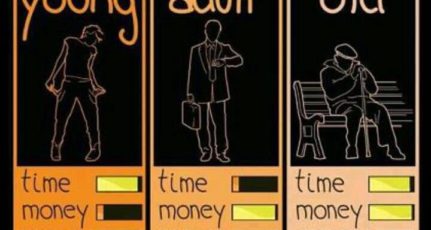When was the last time you gave a talk to a crowd of more than 5 people and felt great about it? No, your toast at your cousin’s wedding doesn’t count! Your palms go sweaty and your knees go weak just at the idea of speaking in front of a crowd-full of auditorium. There isn’t anything dreadful in this world than fear of public speaking, right?
I myself, being a typical introvert, have been an awful speaker, trust me, but have worked it along the way. I over-analyse, and that has helped me in observing the way great speakers deliver their memorable speeches. Words work like magic, words, when delivered efficiently have the power to have a hypnotic effect on the audience. Here is an image from last public seminar by Harsh Agrawal.

The only thing that sets apart great speakers from the ordinary ones is this hypnotic effect that they have on their audience. Involving your audience into what you have to say is a tough thing to do, but not an impossible one. You might have been asked, or might have to regularly give presentations and speeches in whatever field of line you may work. These handy tips might help you in your next presentation and earn extra marks for your methods.
We will go about looking at how the great speeches were delivered keeping in mind all the qualities these world-renowned speakers shared in common.
How To Become Most Memorable Stage Speaker
The grand opening
“All that begins well, ends well.”
A great speech begins with a great opening. A great opening builds the necessary curiosity for your remaining part of your presentation. The best method to build momentum for your presentation is by taking care of your beginning lines. The beginning few minutes of your speech is how your audience will judge you and all of your remaining story will revolve around your first impressions.
Example 1: Sir Ken Robinson, How schools kill creativity
[youtube=http://www.youtube.com/watch?v=iG9CE55wbtY]“Good morning. How are you? It’s been great, hasn’t it? I’ve been blown away by the whole thing. In fact, I’m leaving.”
Deceptively simple, yet effective, Sir Ken Robinson has started off his talk on schools killing creativity in an entertaining manner. This gets the crowd cheering and sets the tone of the talk. He makes an entertaining and profoundly moving case for creating an education system that nurtures creativity.
Example 2: Jamie Oliver, Teach every child about food
[youtube=http://www.youtube.com/watch?v=go_QOzc79Uc]“Sadly, in the next 18 minutes when I do our chat, four Americans that are alive will be dead from the food that they eat. “
He has managed to start off his talk with not so pleasant statistic and maintain the audiences’ attention with it. The stat gets the audience thinking, sympathetic, curious and attentive, all at the same time.
Special Mentions:
- “How do you explain why some people are able to achieve things that seem impossible?” – Simon Sinek, TEDx Talk
- “Okay, now I don’t want to alarm anybody in this room, but it’s just come to my attention that the person to your right is a liar.” – Pamela Mayer, TED Talk
- “Imagine a big explosion as you climb through 3,000 ft. Imagine a plane full of smoke. Imagine an engine going clack, clack, clack, clack, clack, clack, clack. It sounds scary. Well I had a unique seat that day. I was sitting in 1D.” – Ric Elias, TED Talk
Relate to the audience

As the wise Maya Angelou once said:
“People will forget what you said, people will forget what you did, but people will never forget how you made them feel.”
The way you make people feel is much more important than what you say. Speaking isn’t about you. Yes, it is really isn’t in no way about you. It is not about the way you perform. Speaking is all about your audience.
The biggest motive of your speaking should be to give a piece of what you learned to your audience. Speak to the audience in the way you talk to someone you care about. Engage your audience by relating to them.
Example: Dan Pink, The puzzle of innovation
[youtube=http://www.youtube.com/watch?v=rrkrvAUbU9Y]At about halfway along his talk, Dan Pink makes an explicit connection with the audience in the room.
“Think about your own work… everybody in this room is dealing with their own version of the candle problem.” [7:49]
Communicate Confidence

The only way to assert your high expectation statements is by combining it with statements of confidence. Support your highly assertive statements with confidence notes that it could be achieved. This adds an adrenaline sense of motivation among your audience.
Example: Winston Churchill, Iron Curtain
[youtube=http://www.youtube.com/watch?v=jvax5VUvjWQ]Here’s a few statements by Winston Churchill that assert confidence:
“I cannot doubt that we shall achieve our common purpose in the end.”
“We must, and I believe we shall, prove ourselves equal to this severe requirement.”
“I feel eventually there will come – the principle of common citizenship, but that we may be content to leave to destiny.”
Work it in Triads
Triads work magically in speeches. The only thing I have paid attention to most is that all of the successful and famous speakers have used it quite often. Triads is the organization of your content in groups of three.
Organize your points in groups of three and deliver it timely for an effective speech. Finding triads in the speeches of great men is nothing different to finding happy kids in a candy store!
Example: President Barack Obama, Inauguration speech 2009
[youtube=http://www.youtube.com/watch?v=VjnygQ02aW4]“Humbled by the task before us, grateful for the trust you have bestowed, mindful of the sacrifices borne by our ancestors.”
“Homes have been lost; jobs shed; businesses shuttered.”
“Struggled and sacrificed and worked”
“Birth or wealth or faction”
“We must pick ourselves up, dust ourselves off, and begin again the work of remaking America”
“To spend wisely, reform bad habits, and do our business in the light of day”
“The justness of our cause, the force of our example, the tempering qualities of humility and restraint.”
Obama might not perfectly understand the economy of America, but sure does know how to make the most of triads in his speeches.
Example 2: Winston Churchill, Iron Curtain
“Opportunity is here now, clear and shining for both our countries. To
[1] reject it or
[2] ignore it or
[3] fritter it away
will bring upon us all the long reproaches of the after-time.”“We must make sure that its work is fruitful,
[1] that it is a reality and not a sham,
[2] that it is a force for action, and not merely a frothing of words,
[3] that it is a true temple of peace in which the shields of many nations can some day be hung up, and not merely a cockpit in a Tower of Babel.”
Example 3: Dan Pink, The puzzle of innovation
“Too many organizations are making their decisions… based on assumptions that are (1) outdated, (2) un-examined, and (3) rooted more in folklore than in science.”
“(1) How they do it, (2) when they do it, (3) where they do it…”
Using metaphors, irony and humor

Gifting your audience a hearty laugh timely won’t damage you, in fact would be a boon for you. Instead of boring your audience who are already sitting their with their grim faces wondering why the heck did they attend your talk, make them laugh from time to time to set the mood.
An interesting speaker is the one who could make the audience laugh the most in his twenty minutes of talk, without getting off track. By saying making your audience laugh, I do not mean you must become a stand-up comedian to be a great speaker. A great speaker will always manage to find some humor in his talk. Who would you prefer? The one just blabbering stats and figures that could also be read on the presentation or the one who sugar coats his words with his wits and humor?
Example 1: Winston Churchill, Iron Curtain
“From Stettin in the Baltic to Trieste in the Adriatic, an iron curtain has descended across the Continent.”
(A Metaphor to signal the distinction between western and eastern Europe.)
To give security to these countless homes, they must be shielded from the two giant marauders, war and tyranny.
Here are the title deeds of freedom which should lie in every cottage home.
Example 2: Dan Pink, The puzzle of innovation
“I need to make a confession. I did something I regret… in a moment of youthful indiscretion, I went to law school.”
“I never practiced law a day in my life. I pretty much wasn’t allowed to.”
“Is this some kind of touchy-feely socialist conspiracy going on here?”
Time of the talk:18 minutes; Attempts at Humor: 10
Example 3: Ken Robinson, Do Schools kill creativity?
This is the most watched TED talk and no wonder why. Ken Robinson is the master of humor in speeches and has amassed a lot of laughter from his audience. He sure does know how to keep his audience entertained throughout his talk.
“If you’re at a dinner party, and you say you work in education — actually, you’re not often at dinner parties, frankly, if you work in education.”
” It’s a way of getting their head to meetings. If you want real evidence of out-of-body experiences, by the way, get yourself along to a residential conference of senior academics, and pop into the discotheque on the final night.”
“When I was a student, if you had a degree, you had a job. If you didn’t have a job it’s because you didn’t want one. And I didn’t want one, frankly.”
“I saw a great t-shirt really recently which said, “If a man speaks his mind in a forest, and no woman hears him, is he still wrong?”
If you have seen his entire talk, you must know by the number of times you have laughed. Ken Robinson has managed to make his audience lagh almost once per minute!
Time of talk: 20 minutes; Attempts at humor: 22
Ask Rhetorical questions
Most of the speeches I have listened to is nothing more than a monologue. Do no, I repeat, do not make your speech a monologue. Engage your audience with asking rhetorical questions in-between.
Example 1: Winston Churchill, Iron curtain
“What then is the over-all strategic concept which we should inscribe today?”
“Would a special relationship between the United States and the British Commonwealth be inconsistent with our over-riding loyalties to the World Organisation?”
“Why cannot they work together at the common task as friends and partners? Why cannot they share their tools and thus increase each other’s working powers?”
Example 2: Ken Robinson, Do schools kill creativity?
“Everybody has an interest in education. Don’t you?”
“The whole purpose of public education throughout the world is to produce university professors. Isn’t it?”
Vocals and Gestures matter
While a lot has been said about speaking, you can’t neglect the mannerisms of the speaker. The vocal levels and gestures matter a lot while delivering speeches. Vocals and gestures are unique to everyone and polishing ones mannerisms would make a great impact on the audience.
Example: Dan Pink, The puzzle of motivation
Although the biggest drawback of Dan Pink’s drawback is his finger waggling, he has quite mastered his voice emulation and gestures. For a point in the presentation, to demonstrate low, medium and high rewards, Pink uses his arm level, instead of a boring PowerPoint slide. His use of emphasis, pauses and varied pace are all a well done piece of art.
These gestures and vocal emulations not only helps to convey the speaker’s enthusiasm and convictions, but also helps to aid thoughts through drama.
Employ Contrast
The best and only way to highlight key catchphrases is by making use of contrasts. Use contrasts to highlight your catchphrases. The other way is to signal catchphrases to make the audience wary of something important coming ahead.
Example 1: Winston Churchill, Iron Curtain
“We must make sure that its work is fruitful, that it is a reality and not a sham, that it is a force for action, and not merely a frothing of words, that it is a true temple of peace in which the shields of many nations can some day be hung up, and not merely a cockpit in a Tower of Babel.”
“A shadow has fallen upon the scenes so lately lighted by the Allied victory.”
Example 2: Ken Robinson, Do schools kill creativity?
“But something strikes you when you move to America and when you travel around the world: Every education system on earth has the same hierarchy of subjects.”
“And my contention is, all kids have tremendous talents.”
Example 3: Dan Pink, The puzzle of Innovation
“This is one of the most robust findings in social science [pause]… and also one of the most ignored.”
“That’s actually fine for many types of 20th century tasks. But for 21st century tasks…”
Make the most of Repeating
The frequent use of repetition gives rise to the obvious, bu the subtle use of repetitions would highlight key phrases efficiently. Repeating key theme words throughout the theme would work wonders.
Example: Martin Luther King Jr., I have a dream
[youtube=http://www.youtube.com/watch?v=smEqnnklfYs]Here’s how frequently key theme words have been repeated in ‘I have a dream’:
- freedom (20 times)
- we (30 times)
- our (17 times)
- dream (11 times)
- nation (10 times)
- justice (8 times)
Organize, Practice
Practice makes a man perfect, and the only way to master public speaking is by practicing it often. Give a speech in front of the mirror, to gain more confidence and take a look at the man the audience is about to bear for 20 minutes.
Organize all of your stories, what comes first, what comes last, and practice till you feel you are at your best. One of the greatest speech deliverers, Steve Jobs was rumored to have rehearse his entire keynote speeches and product demos alone on the same stage where he announced them, many times.
Example: Steve Jobs, Commencement speech, Stanford. 2005
[youtube=http://www.youtube.com/watch?v=UF8uR6Z6KLc]Steve Jobs, arguably one of the best people to look to for public speaking, and how can we forget his commencement speech given at Stanford back in 2005. He delivered one of the all time best commencement address in the entire history.
“Today I want to tell you three stories from my life. That’s it. No big deal. Just three stories.”
Conclusion: Learn from the masters
No matter how great of a speaker you might be, something you intend on doing has already been done before. And the best way is to learn it from the masters of the trade.
Consider the following:
- How to prepare for your first stage presentation
- Popular TED talks of 2013
- Academy Awards acceptance speeches
- Eloquent Women speakers of all time
- 35 Greatest speeches in history
Do you have additional tip for others to become memorable public speaker? Do share this awesome public speaking guide with others on your social-network.






A very great articles about how to become a great speaker. Making a good speaker is very difficult. I am very inspire from the video of steve jobs. Making a perfect speaker will require more than confidence and to know in advance what the crowd is expecting from him. Thanks a lot@srikanth for sharing these some of the best videos and articles with us.
I think this is not just an article but an entire case study on public study. I had delivered a presentation in my college some months ago and for that I had researched on public speaking and presentation a lot just like any management student would do. The teacher (who was blind) and students applauded me but I think I wasn’t up to the mark as compared to management students. Well if this article was written back then I would have been able to deliver an excellent presentation which I would also be proud about.
a completely true article. There is a lot of things from which you can take inspiration. Every great person speaking in public must have these things in common to make a long lasting impression at first site.
I do agree that above common features in great public speakers mentioned by Srikant in this blog post.. It requires great skills and hardwork to become a such great speaker ..
Hi Srikanth, very well presented. Frankly by looking at the topic i had doubt shall i bother…but as i started got magnated. Nice selection of vedio clipps as well. I liked it as informative & good to read.
I think this is not just an article but an entire case study on public study. I had delivered a presentation in my college some months ago and for that I had researched on public speaking and presentation a lot just like any management student would do. The teacher (who was blind) and students applauded me but I think I wasn’t up to the mark as compared to management students. Well if this article was written back then I would have been able to deliver an excellent presentation which I would also be proud about.
This is something Cool Srikanth.I hope that it will help me in future.
Between I’m jealous of your Writing 😉 😛
Hey Krishna,
Thanks for your comment. Nothing to be jealous of; read more, write more, you’ll develop your writing sooner than you could imagine.
great and well explained article with lots of examples. i do agree with all of the above points but the point which i like the most is first impression is the last impression. it’s really hard to give a speech in front of huge number of audience. thanks Srikanth for sharing this article with us.
Hey Gaurav,
The audience tends to quickly come to the conclusion of liking or disliking at the first instance, so it matters for you to make a better first impression. Glad that you liked it.
It takes a lot to deliver an astonishing presentation in front of different people. At first me too wasn’t confident about public speaking and presentation but during a technical presentation in college with a group of 5 people the teacher (who is blind) and my fellow mates told me I gave an awesome presentation out of other 4 groups and my group members. I had researched a lot before the presentation just like any management student would do which helped me in giving a solid and confident presentation. But if this article was written back then I might have given more than I expected. This article here is like a case study which will be helpful for students about to give presentation and public speeches. An article worth to be shared over the Internet. Thank You! Shrikant
Hi Abhishek,
Congratulations on your peers’ belief that you were the better of the pack. This article was intended more like a case study a did on the above videos. These were what I found out about great speakers after going through them with much attention. Now that you know them, put it to better use next time you get the chance. Spread the Joy!
A very great articles about how to become a great speaker. Making a good speaker is very difficult. I am very inspire from the video of steve jobs. Making a perfect speaker will require more than confidence and to know in advance what the crowd is expecting from him. Thanks a lot@srikanth for sharing these some of the best videos and articles with us.
Hey Vikas,
Thanks for taking your time to comment. Hardwork and due diligence could move mountains. Identify and work on your weakness to be a better public speaker real quick.